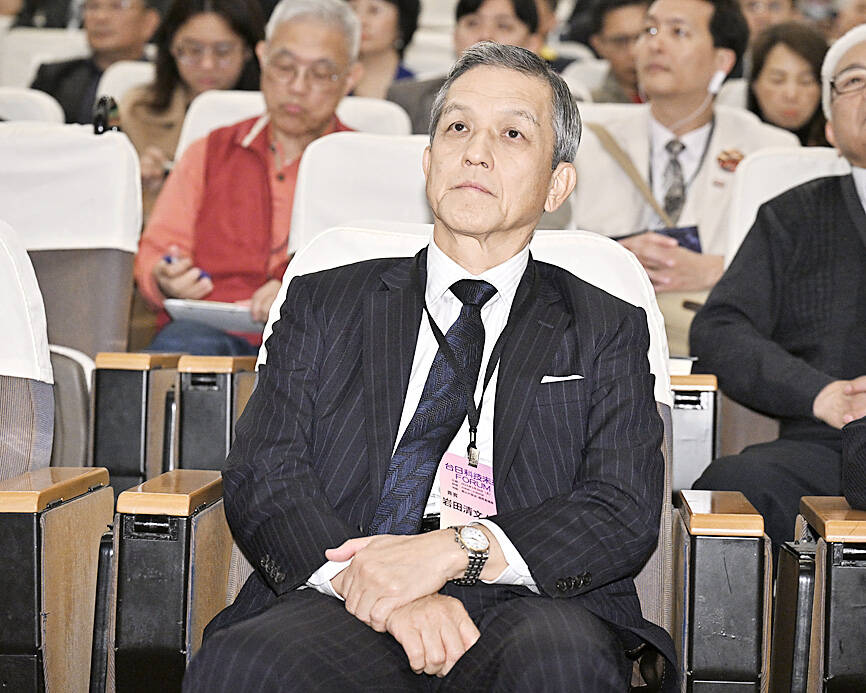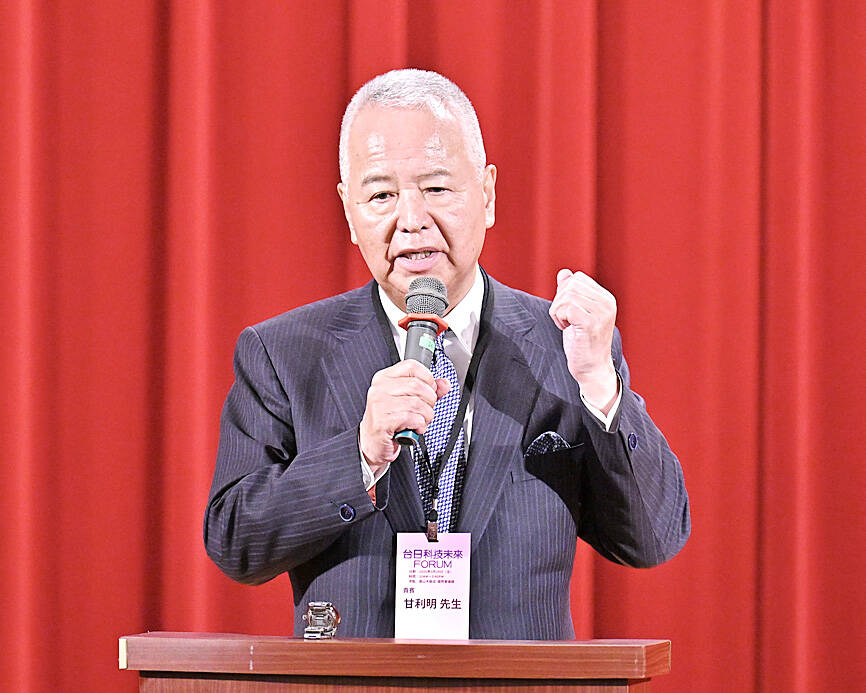Japan’s former top army commander yesterday expressed hope that Taiwan would form a “semiconductor alliance” with Japan.
“Taiwan and Japan share a destiny,” retired general Kiyofumi Iwata, a former chief of staff of the Japan Ground Self-Defense Force, told a conference in Taipei on semiconductors and geopolitics hosted by the Indo-Pacific Strategic Thinktank after reiterating former Japanese prime minister Shinzo Abe’s aphorism that “a Taiwan contingency is a Japan contingency.”
The Russian invasion of Ukraine has shown the important role chips play in modern warfare, Iwata said.

Photo: Tu Chien-jung, Taipei Times
Semiconductors are the key component in a vast array of weapons ranging from High Mobility Artillery Rocket Systems, Javelin anti-tank guided missiles, uncrewed aerial vehicles and telecommunications satellites, he said.
Chips used in military equipment are comparatively large wafers ranging from 45-nanometers to 250-nanometers, Iwata said.
Despite Western and Japanese embargoes, Moscow has sourced military-grade semiconductors from China, with Chinese chips accounting for 89 percent of all semiconductor imports in Russia, he said.

Photo: Tu Chien-jung, Taipei Times
Artificial intelligence (AI) and chips are expected to have an even larger impact, as militaries are already adopting drones for land, sea and air warfare, he said.
The performance goals of the US Air Force Collaborative Combat Aircraft program suggests that a few soldiers would soon be able to direct hundreds of combat drones at a time, he said.
Beijing’s policy is to build the Chinese People’s Liberation Army (PLA) into a force capable of invading Taiwan, he said, adding that the PLA leadership has shown an appreciation for the military potential of chips and AI.
Taiwan, Japan and the US must develop a joint network of semiconductor supply chains to ensure they retain the capability to deter the PLA and defeat it if necessary, Iwata said.
Japanese would no more allow Taiwan to fall into Chinese hands than Taiwanese themselves, he said in a call for greater cooperation in technology between the two nations.
Former Japanese minister of economy, trade and industry Akira Amari told the conference that Chinese-developed AI program DeepSeek poses a security threat to the nations of its users and is part of Beijing’s bid to replace global digital infrastructure.
Out of the global race to develop generative AI, DeepSeek is the first to turn a profit, largely thanks to low costs and giving users ownership over content they create, Amari said.
China’s aim is to make the world dependent on DeepSeek as infrastructure, granting Beijing access to data on a global scale, he said, adding that China owns 100 percent of input to the program.
DeepSeek users who work for commercial entities or research groups are feeding their intellectual property to a Chinese-owned database, allowing Beijing to know of or predict technological developments, he said.
China would effectively possess knowledge that enables it to take away any government’s autonomy and ability to make decisions independently, Amari said.
Japan is not a competitor, but a partner in Taiwan’s efforts to create free and secure global chip supply chains, he said.
Society is undergoing a systemic digital transformation in which all activities are driven by data, he said, adding that semiconductors undergird the functioning of nations and economies.
By any measure, Taiwan Semiconductor Manufacturing Co (TSMC) is the world’s sole supplier of advanced chips unrivalled by Intel or Samsung, an achievement Taiwan is rightfully proud of, he said.
Eighty percent of TSMC’s revenue is accounted for by a handful of companies, including Nvidia, which controls semiconductor design, Amari said.
With an ever-growing number of companies trying to enter the chip design sector, TSMC’s original equipment manufacturing capacity would not suffice to meet demand, he said.
Japan’s creation of Rapidus is meant to fill this gap and would not be a direct competitor to TSMC, given the latter’s increasing specialization on customization and end-of-line packaging, he said.
Working hand-in-hand, Rapidus and TSMC could stabilize the world’s chip supply, and ensure free and democratic societies continue their digital transformations, he said.
Hundreds of companies and thousands of manufacturing steps go into making the most advanced chips, he added.
The US, Japan and the Netherlands source 80 percent of the world’s chipmaking equipment, Japan sources 55 percent of the materials and Taiwan makes 94 percent of the final product, Amari said.
The notion that one country can produce top-of-the-line chips on its own is a fantasy, but explaining this to US President Donald Trump might be the biggest challenge to the industry, he added.

The manufacture of the remaining 28 M1A2T Abrams tanks Taiwan purchased from the US has recently been completed, and they are expected to be delivered within the next one to two months, a source said yesterday. The Ministry of National Defense is arranging cargo ships to transport the tanks to Taiwan as soon as possible, said the source, who is familiar with the matter. The estimated arrival time ranges from late this month to early next month, the source said. The 28 Abrams tanks make up the third and final batch of a total of 108 tanks, valued at about NT$40.5 billion

Two Taiwanese prosecutors were questioned by Chinese security personnel at their hotel during a trip to China’s Henan Province this month, the Mainland Affairs Council (MAC) said yesterday. The officers had personal information on the prosecutors, including “when they were assigned to their posts, their work locations and job titles,” MAC Deputy Minister and spokesman Liang Wen-chieh (梁文傑) said. On top of asking about their agencies and positions, the officers also questioned the prosecutors about the Cross-Strait Joint Crime-Fighting and Judicial Mutual Assistance Agreement, a pact that serves as the framework for Taiwan-China cooperation on combating crime and providing judicial assistance, Liang

A group from the Taiwanese Designers in Australia association yesterday represented Taiwan at the Midsumma Pride March in Melbourne. The march, held in the St. Kilda suburb, is the city’s largest LGBTQIA+ parade and the flagship event of the annual Midsumma Festival. It attracted more than 45,000 spectators who supported the 400 groups and 10,000 marchers that participated this year, the association said. Taiwanese Designers said they organized a team to march for Taiwan this year, joining politicians, government agencies, professionals and community organizations in showing support for LGBTQIA+ people and diverse communities. As the first country in Asia to legalize same-sex

MOTIVES QUESTIONED The PLA considers Xi’s policies toward Taiwan to be driven by personal considerations rather than military assessment, the Epoch Times reports Chinese President Xi Jinping’s (習近平) latest purge of the Chinese People’s Liberation Army (PLA) leadership might have been prompted by the military’s opposition to plans of invading Taiwan, the Epoch Times said. The Chinese military opposes waging war against Taiwan by a large consensus, putting it at odds with Xi’s vision, the Falun Gong-affiliated daily said in a report on Thursday, citing anonymous sources with insight into the PLA’s inner workings. The opposition is not the opinion of a few generals, but a widely shared view among the PLA cadre, the Epoch Times cited them as saying. “Chinese forces know full well that